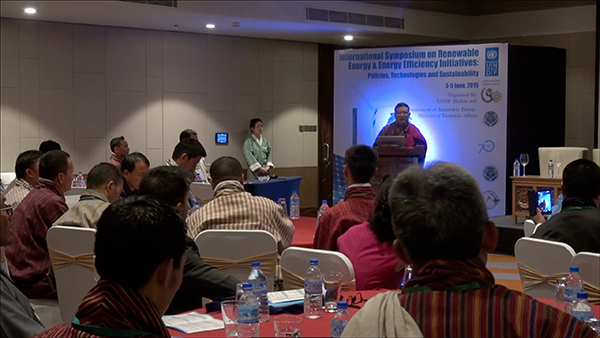 While hydropower continue to remain a major source of energy in the country, the department of renewable energy is asking the government to set its sight on other alternate energy sources like wind and solar to diversify the energy basket.
While hydropower continue to remain a major source of energy in the country, the department of renewable energy is asking the government to set its sight on other alternate energy sources like wind and solar to diversify the energy basket.
Alternate energy, besides hydropower should be developed given signs of drying water becoming more evident. A symposium on renewable energy and energy efficiency, held in the capital, explored the economic feasibility and creating the right conditions for developing renewable energy.
However, cost impediment and technology continue to remain the biggest challenge of developing wind and solar energy, providing all the more reason to focus on hydropower. According to an estimate, the average cost of generating solar power is Nu 15 to Nu 30 while it is Nu 16 a unit for wind and Nu 1.6 a unit for hydropower.
Economic Affairs Secretary Dasho Yeshi Wangdi said, the government should align its policy towards developing other forms of renewable energy. He said governments should come up with policies that are best suited to the investment in renewable energy.
Chief engineer with the department of renewable energy Mewang Gyeltshen said the cost of building other renewable energy would eventually come down and the department was looking at the best place to install windmills and solar panels where cost would be relatively cheaper.
Although it is going to be expensive, there is a lot of global effort; technological refinement and the prices are coming down, Mewang Gyeltshen said. Also, cost for setting up alternative energy was also location specific.
“So we are looking at the best location to set up windmills and solar panels.”
He said hydropower has to be continued as it is a low hanging fruit, but it doesn’t mean other forms of clean energy shouldn’t be explored to diversify the energy basket.
“The need to go for non-water based energy is what we are looking for. Figures suggest rivers are drying up. The question is would we have sufficient water to generate our electricity.”
Cost impediment, rugged terrain, scattered settlement and limited market are some of the major challenges when it comes to developing other renewable energy in Bhutan.







